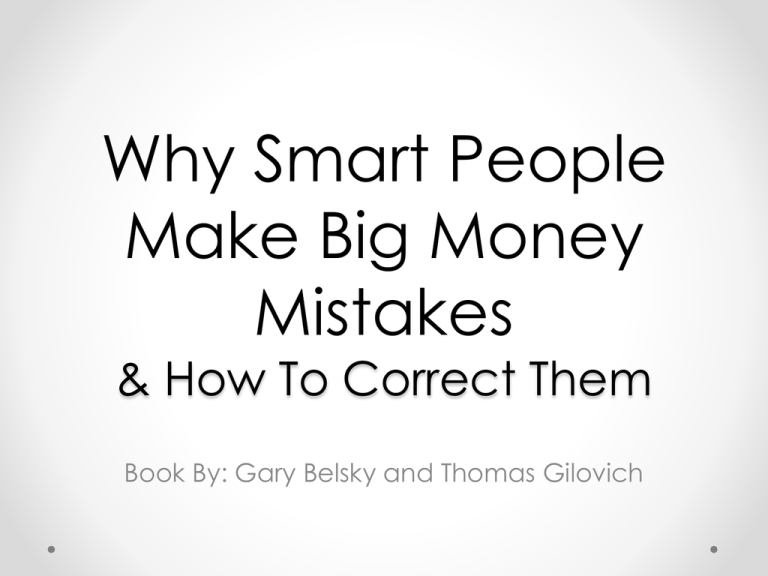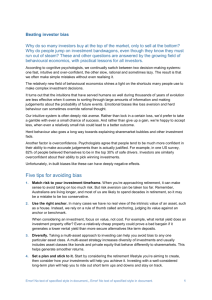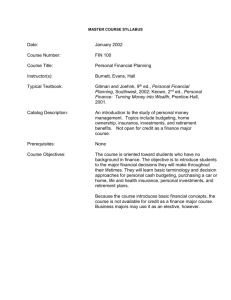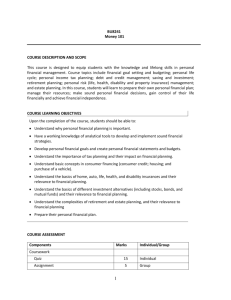Available
advertisement

Why Smart People Make Big Money Mistakes & How To Correct Them Book By: Gary Belsky and Thomas Gilovich Our Goals: • Define the most common financial mistakes. Then offer action steps to safeguard your own financial decisions • Examine how “most” people behave with money. Then explore and compare your own money decisions and actions. • Create an open dialog To discuss our own money mistakes as a group and learn from these past money failures. MISTAKE #1: Not All Dollars Are Created Equal Mental Accounting The Man In The Green Bathrobe Story What To Do About It: • Imagine all income is earned income • Treat all money equally • Park “found money” in a safe place before you decide what to do with it (Park $ 3-6 mo, then use) • Imagine a world without plastic • See the trees through the forest (DR reverse concept) • Divide and conquer (Indian & Chinese workers) • Use mental accounting to your advantage (automatic investments or savings; payroll deductions) MISTAKE #2: When Six Of One Isn’t Half A Dozen Of The Other Loss Aversion Sunk Cost Theory (Good $ After Bad) Weber’s Law The Power of Framing What To Do About It: • Limit the damage you can do (Barbell Strategy) • Diversify (Less likely to act emotional & stick to your plan) • Your timeline matters: Follow the Law of Five Years (Safeguard the college fund and retirement) • Heed the Rule of 100 (Risky vs safe investments) • Use your pen (Plans written down are more likely to happen) • Forget the past (Overweighing past investments: Career, Marriage, Bad Book or Movie) • Turn losses into gains (Income tax deduction- Lorena) • Take advantage of Weber’s Law (segregate gains) • Pay less attention to investments (Ignore WS & Media) MISTAKE #3: The Devil That You Know Decision paralysis Fear of regret & Preference for familiar “Maximizer” vs “Satificer” Trade-off contrast & Extremeness Aversion Endowment Effect What To Do About It: • Choose fewer choices (Try three choices) • Remember doing nothing (or deciding not to decide) is a decision (sins of omission as common & dangerous as commission) • Don’t forget opportunity costs (What will it cost me?) • Put yourself on autopilot (Reduce Decisions; Increase Savings) • Make deadlines work for you (Increase Effectiveness) • Play your own devil’s advocate (Shift perspective: Argue for/against the opposite- OR- Which would you eliminate completely vs choose?) • If you’re not an expert, ask one (Seek advice, Make up your own mind) MISTAKE #4: Number Numbness Three Money Illusions: 1) Inflation 2) Probability (The Role of Odds & Chance) 3) Bigness Bias (Tendency to neglect small numbers that make a big difference over time) Three Dangers of MONEY ILLUSIONS: 1. Can cause us to underestimate future need (college, retirement) 2. Provide a false sense of history (ie. We tend to believe adages like home values always appreciate –OR– stocks provide the highest returns. This may be true in the long term, but in the short term? Consider your investment window and tolerance.) 3. Can lead us to foolish or irrational behavior- Be wary of the “meaning” placed on numbers as inflation and base lines rise! Example: In 1987, a 200 point swing in the Dow Jones was equal to a 10% change in the average. Today it represents about a 2% change! What To Do About It: • Don’t be impressed by short term success • Because chance plays a greater role than you think in investment performs, you should play the averages. (Think Index Funds vs Actively Managed Funds. 75% of AMF do not beat market averages over 10+ year spans.) • Know when time is on your side and when it isn’t (Inflation- decreases buying power over time vs Compound Interest) • Embrace the base rate (Remember Dow Jones example) • Read the fine print (Fees matter) Fees Matter: Long-Term Impact of Fees: MISTAKE #5: Dropping Anchor Confirmation Bias First Impressions Matter What To Do About It: • Broaden your personal board of advisors • When in doubt, check it out • Get real • Be humble MISTAKE #6: The Ego Trap Not Conscious Arrogance **Tendency to overestimate our abilities, knowledge, and skills (**at whatever level we place them) Dangers of Overconfidence: • Planning Fallacy (over-optimism about our plan) • Underprepared- People think they are in better financial shape than they are in (ie. Think they’re closer to retirement than they actually are.) • People spend large amount of money on products or services they know little about. (ie. Laptops, cars) • FSBO or Fizzbo Fallacy (Reality: Most end up with less than if they’d used a quality broker.) • You fit the statistics (75% of investors in ATF do not beat the markets over 10 year window) • Assign success to skill, failure to bad luck or Brag about wins, ignore losses…and therefore reality • Fall for the familiar (Old Adage: Invest in what you know) What To Do About It: • Consider you could be wrong –or– too optimistic • Establish rules for decision making • Get an opinion (But be wary of confirmation bias) • Safeguard with the Barbell Strategy (ie. Invest 90% of your investments in index funds –or– “sure” investments and play with 10%) MISTAKE #7: Herd It Through the Grapevine Herd Mentality (Buy or sell when others do; Follow hot tips by newsletters, reports, or magazines) Better Brainstorm Tip Worse Than Average • Fact 1: From 1988 through 2008, the average stock mutual fund posted a yearly return of 8.4 percent, while the average bond mutual fund returned 7.4 percent per year. • Fact 2: From 1988 through 2008, the average investor in a stock mutual fund earned 1.9 percent, while the average investor in a bond mutual fund earned less <1.0 percent. What’s wrong with this picture? A: Most people flit in and out of market in order to “maximize” returns…Clearly they are not! What To Do About It: • Buy & Hold (Avoid following the herd or timing the market) • Avoid hot investments • Tune out the noise (Ignore most financial news. Listen to media and lose. Look at your portfolio when you rebalance, suggested about once per year.) • Rely on your predetermined rules) • Be a contrarian (Buy low, sell high. HINT: This is generally doing the opposite of the herd.) MISTAKE #8: Emotional Baggage Be wary of Emotional Shopping Slow decisions after big life events TV isn’t real (Duhhh!) Affected by what you read (and watch) Overestimate risk of poor health & accidents (Pay too much in deductibles) What To Do About It: • Buy what you desire and need. Don’t shop to curb emotion. • Don’t make hasty decisions with money from death, divorce, or other emotional life situations (DR says wait for at least 6 months.) • Realize what influences popular culture plays in what you think you need(Sex & the City) • Be aware of how media and other people affect your financial outlook. (Purposely surround yourself with the “right” people. ) • Remember fear sells (and damnation saves) In Summary… • Every dollar spends the same Create a plan ahead of time and use it for all money • Use Loss Aversion to your advantage Save & invest automatically • Money that’s spent is money that doesn’t matter (sunk cost theory) Don’t let past spending affect current behavior. • It’s all in how you look at it (coding losses and gains) Seek to look at reality not just wins -continued- In Summary… • Too much choices makes choosing tough (choice conflict and decision paralysis) When making purchases, limit yourself to three choices • All numbers count, even if you don’t like to count them (bigness bias) and will drain your wealth Limit your “risky” investments to 10% of your portfolio • You pay too much attention to things that matter too little (anchoring) and too little attention on things that do Examine the long term impact of small daily decisions (ie. The real cost of buying lunch out every day instead of packing your own lunch or your daily SB latte…Yikes!) -continued- In Summary… • Your confidence is often misplaced Embrace & learn from your mistakes • It’s hard to prove yourself wrong (confirmation bias) Share your financial decision with trusted, moneysavvy friends and critics alike. Consider you could be wrong! • The trend isn’t always your friend (herd investing) Ignore wall street and other hot investment tips. Do your homework and trust long term returns. Consider some your “big” wins are “luck” not reality. and finally… In Summary… • Too much info can hurt you For most investors, a yearly portfolio review is enough. Avoid tinkering or jumping in and out based on market timing. • Your emotions affect your decisions more than you imagine Implement a cooling off period before making financial decisions. Stick to your plan! • You are not very good at predicting the future Develop a routine when contemplating long-term financial decisions: buying or selling a home, starting a business, lending money to friends or family, etc. • Small tweaks have big results Automate savings and investing for retirement. You’ll soon not miss the difference.






